Alfred Hitchcock needs no introduction. The director left his mark in cinema as the “master of suspense,” and in pop culture as the portly, plummy voiced host of his own TV show, Alfred Hitchcock Presents. His mix of murder, mystery, and dark mirth made films such as 1943’s Shadow of a Doubt, 1959’s North by Northwest, and 1960’s Psycho recognizable classics. His 1958 film Vertigo took over from 1941’s Citizen Kane as the British Film Institute’s Best Film Ever Made. Then, the US National Film Registry selected seven of his films for preservation. These include the films mentioned above, 1946’s Notorious and of course 1963’s The Birds, which celebrates its 55th anniversary in 2018.
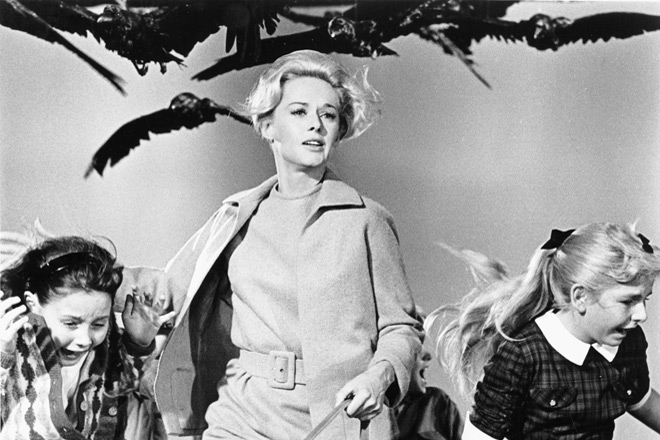
Premiered on Thursday, March 28, 1963 in New York City via Universal Pictures, The Birds was the third of three Hitchcock films based on works by British Author Daphne du Maurier. However, it is also the one that changed the most in the transition from the book to the silver screen. His previous efforts, 1939’s Jamaica Inn and 1940’s Rebecca retained their Cornwall setting and characters. That in mind, The Birds traded the Cornish moors for Bodega Bay, California. Then, they changed the protagonist from the book’s farmhand Nat Hocken, to flirty socialite Melanie Daniels (Tippi Hedren: The Bold and the Beautiful series, A Countess from Hong Kong 1967). It does have some book-inspired scenes though such as the school chase, the farmhouse siege, and the deadly birds themselves. So that is something.
All these factors noted, Du Maurier cited the film as her least favorite Hitchcock adaptation due to the changes. For his part, Hitchcock was perfectly happy to apply some creative license. His take on Jamaica Inn was criticised for softening the dark story with light-hearted jokes. Although Rebecca was more successful, but its faithfulness was more due to Producer David O.Selznick. Despite adding some personal touches, Selznick re-shot and re-recorded scenes to make it more like the book. So, perhaps it is little surprise that he told The Birds Script Writer Evan Hunter, aka Ed McBain (The Blackboard Jungle book 1954. 87th Precinct novel series), “We’re throwing away everything except the title, and the notion of birds attacking human beings.”
He had read the original book (“I read it only once, and very quickly at that”), but he was largely inspired by a more local incident. In August 1961, the Santa Cruz Sentinel reported on a bird invasion in Capitola, California. Residents were woken up by birds slamming against their homes in the middle of the night. By sunrise, the dead birds littered the streets. Hitchcock asked the Sentinel for a copy of the paper for research material. A few weeks later, he hired Hunter to write the script, beginning the film’s 2-year journey to the screen.
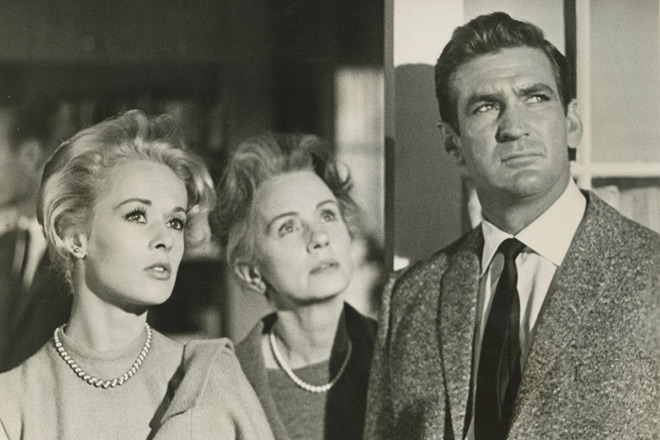
According to his 1997 autobiography, Me and Hitch, Hunter said he was hired because the director liked his suspense work. The critical acclaim for The Blackboard Jungle novel certainly helped. He also had experience writing stories for Hitchcock via Alfred Hitchcock’s Mystery Magazine and Alfred Hitchcock Presents. Though, that did not mean he was free from criticism. Hitchcock would often consult his friends Hume Cronyn (The Postman Always Rings Twice 1946, Brewster’s Millions 1985) and V.S Pritchett (It May Never Happen 1945, The Spanish Temper 1954) over the screenplay during its final stages. Hitchcock himself also criticised previous drafts as lacking characterisation for the leads, and lacking drama at some points. It eventually met Hitchcock’s standards, though evidently not everyone else’s.
Although, others have found favor with the screenplay of The Birds. Hitchcock liked Hunter’s idea of bringing in Rom-Com elements to lull the audience into a false sense of security. The idea being that, while they know the birds will attack, they will not know when. There is no clear answer as to why the birds attack either. According to Hunter, the original idea was that they were some divine punishment for a secret the townspeople were holding. While Hitchcock, talking to Maurice Séveno (Actualités Télévisées series. L’État de Grâce 1983) in 1962, said “the birds are tired of being killed, plucked, and eaten by mankind, so they decide to avenge themselves.”
That may be for the best though. If the answer was any more concrete, The Birds might not have impressed as well as it did. Or at least its impression would not have lasted as long. It was a special effects extravaganza for its time, using yellow-screen to capture the birds’ wing-flapping more precisely. It may have aged noticeably by modern standards, but it did earn Special Effects Technician Ub Iwerks, co-creator of Mickey Mouse, an Oscar nomination at the following Academy Awards.
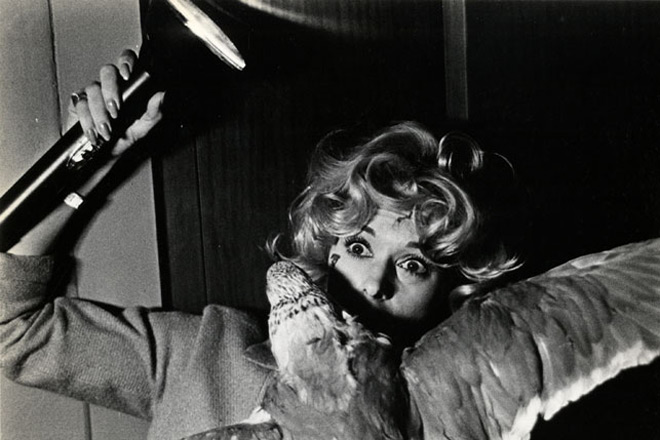
Hedren earned herself the Most Promising Newcomer award from Photoplay magazine. She also shared a Golden Globe for New Star of the Year with Ursula Andress (for Dr No) and Elke Sommer (for The Prize). Additionally, Camille Paglia also praised Hedren’s performance in her 1998 book on the film. She cited how well she did under the notoriously demanding production of both The Birds and the following year’s Marnie. Jones may have cared little for the lover-mother-ex subplots, but Paglia found it to be a fascinating power struggle. Taylor’s character Mitch is fought over between Hedren’s newcomer Melanie, his mother Lydia (Jessica Tandy: *batteries not included 1987, Driving Miss Daisy 1989), and ex-lover Annie (Suzanne Pleshette: The Bob Newhart Show series, Spirited Away 2003). As the birds’ assaults increase, Lydia gains the upper hand as Melanie falters.
Complex sexual dynamics and familial relations are not exactly foreign to Hitchcock’s work. They fuelled both Vertigo and Psycho respectively amongst others. It makes for an interesting reading of the film, one that the book cannot offer. While some may give film fans a reason to check out the source material, Paglia’s view could give sceptics a reason to give The Birds a second try. Whether the subplots add or subtract from the film, both sides agree it brings the chills through its build-up and direction. Through that, Hitchcock makes a flock of birds as intimidating on-screen as some of the best cinematic villains. Hence, why The Birds is a cinematic piece of history worth discussing even 55 years after first taking flight.
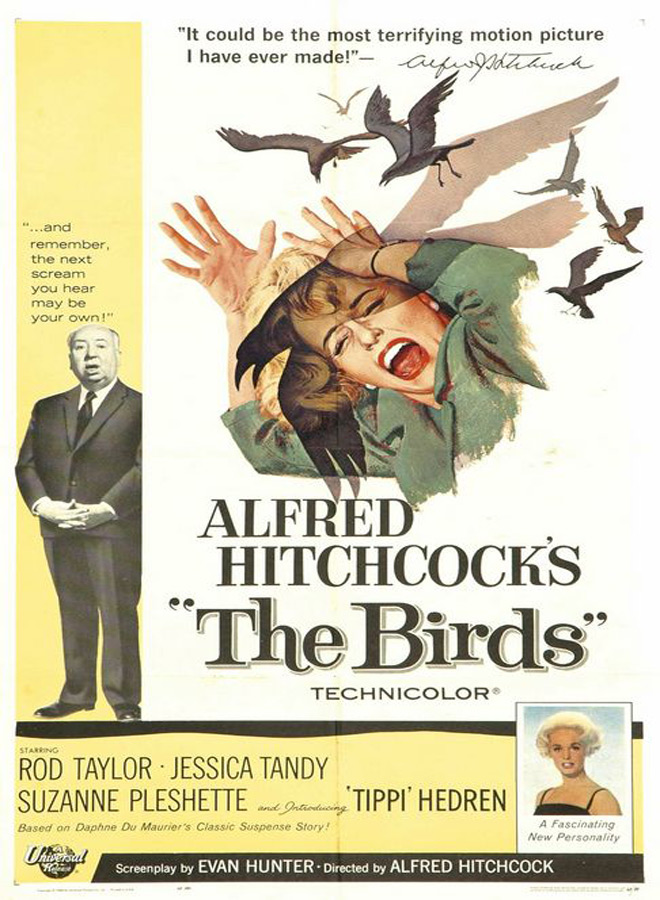


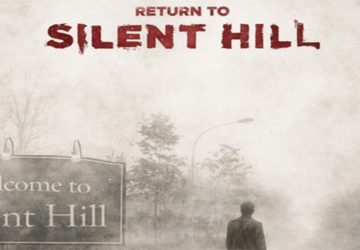
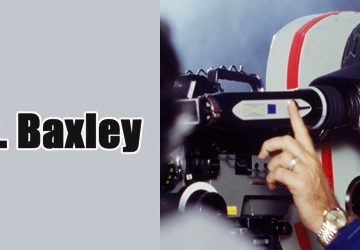


No comment